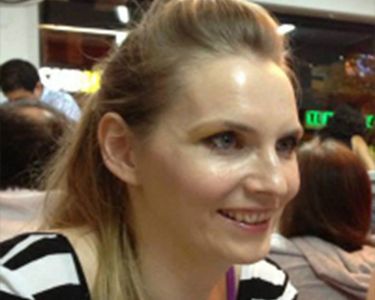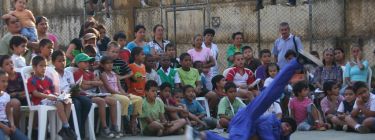
The cocktail of challenges of disadvantaged in crisis
Ruth Daniel, CEO of In Place of War and Honorary Research Fellow at University of Manchester; Teresa Ó Brádaigh Bean, Leader of research activities at In Place of War and Honorary Research Fellow at University of Manchester
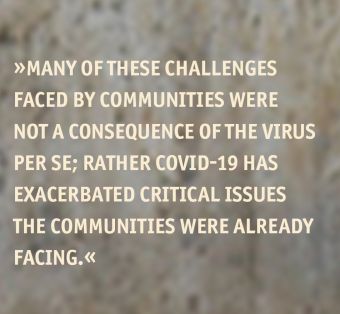
The cocktail of challenges of disadvantaged in crisis
Making the case for the civic role of the creative and cultural ecosystem in a Renaissance
The ongoing COVID-19 Pandemic has had a devastating impact on communities around the world. Whilst in Europe many have enjoyed the cushion of working from home or social protection mechanisms (special benefits and unemployment protection), disadvantaged communities in Latin America, Africa and the Middle East have been left vulnerable on all fronts. Operating in mainly the informal economy or in precarious employment, living in overcrowded housing, lacking access to information or PPE (personal protective equipment), and enduring some of the strictest and militarised lockdowns in the world presented these communities with a cocktail of challenges. This piece builds on the work of In Place of War in sites of conflict in the Global South for over 17 years working with grassroots arts-based peace-building as well as 120 cultural leaders and gives witness to the role of community arts organisations in civic engagement, using the arts to mobilise communities to make positive social change.
Picture above: break dance performance in a sports ground, Medellin, Colombia. Copyright: Leonardo Jimenez
COVID-19 was a further catalyst for community arts-based social mobilisation and civic engagement to tackle immediate issues of food insecurity, lack of sanitation, wellbeing, and public health awareness and school closures. Many of these challenges faced by communities were not a consequence of the virus per se; rather COVID-19 has exacerbated critical issues the communities were already facing. Working in partnership with our network of change-makers, drawing on their local knowledge, existing community relationships and understanding of how best to respond to the pandemic, we supported them in delivering direct, bespoke assistance, determined and led by those located in beneficiary communities. These locally-led processes resulted in a range of responses from the creation of community kitchens to mobile sound systems and online fundraisers and concerts to provide economic assistance to artists and the wider communities. Despite the array of projects, they all reaffirmed our understanding that art can be key in fomenting civic participation and positive societal change.
Despite or because of COVID-19: a new role for social enterprises
This process also demonstrated how, with a small amount of funding, informal, grassroots organis-tions rooted in communities that are often underrepresented in the cultural sector and who can’t normally access funding can lead to long-term positive outcomes. This included the development of sustainable social enterprises. Thus, this invites reflections in the European context and beyond about the importance of embedding participatory grant-making for grassroots arts organisations as a strategy to create a more inclusive and diverse creative ecosystem that supports arts-based sustainable development.
Hunger isn’t in Lockdown: COVID-19 in the Global South
As COVID spread, and lockdowns were imposed globally, our network of change-makers provided grim insights into the impact of COVID-19 on some of the world’s most disadvantaged communities. Here is a snapshot from artists and cultural practitioners on the ground in Latin America, Africa and Asia in April 2020.
MC Benny, Hip Hop artist, Northern Uganda: “People are living in fear, many are testifying that this is worse than a physical war. Our team has already seen that government forces have been using excessive force to enforce lockdowns”
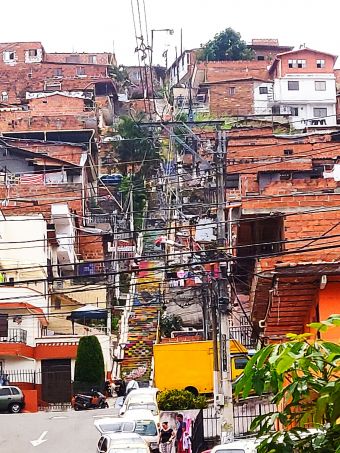
Nathalia Garcia, Elemento Illegal, Medellin, Colombia: “Communities in El Faro, an informal neighbourhood on the outskirts of Medellin where many displaced families forced to flee violence have been severely affected by COVID. The area is home to 400 vulnerable families living in dire conditions, working in informal and precariousemployment. Lockdown has left them unable to generate income and 98% of them are struggling to cover their basic needs with hunger being the most pressing issue. Preventing the spread of COVID in the area is further compounded by lack of basic sanitation and hygiene products.”
Vijay Kumar, India: “There is simply no support from the government, some families are on edge of starvation during these days.” Our team notes, “India has some of the most extremely high-density urban populations, social distancing is simply not an option for most of these people, and the consequences of lockdown are costing lives through hunger and lack of medicine.”
Robert Mukunu, Mau Mau Arts, Kenya: “A young boy was shot by police on the balcony of his home in Kiamaiko, Nairobi, because ‘he was out during the curfew’ which seems like a dark irony that a citizen was killed by police who were ensuring he was indoors to protect him from COVID. Questions still remain unanswered on why the government is charging for treatment of corona-related ailments as well as the use of testing kits and masks donated to the government.”
Re-birth in the midst of lock down? How to leverage support and funding from the Music Industry in crisis conditions
Whilst IPOW’s work has focused on supporting and building networks with grassroots artists in the Global South, the organisation has also developed relationships with commercial music industry partners. During the pandemic, given the devastating impact of COVID on the cultural sector, these organisations were keen to support artists and cultural practitioners. Thus, working in partnership with In Place of War, small grants of $500 to $2,000 were made available to the change-maker network.
Setting up an innovative process for participatory grant-making, locally informed decision-making and implementation.
A call for applications was sent to our change-maker network via Whatsapp in French, English and Spanish, resulting in 45 applications. The application process was open in which applicants had to explain the impact of COVID on their community and their ideas to address these issues. A small panel from the In Place of War Board and team reviewed applications, selected recipients, and funds were distributed promptly, having immediate impact. The overall process took only two weeks, including the due diligence process required to meet charity regulations. Given the geographical spread and diverse contexts in which artists operate, projects ranged from tackling food insecurity through the establishment of community kitchens, bakeries and allotments, public awareness campaigns about preventing the spread of COVID-19 using visual arts, and issuing grants to artists.
Change-Maker case studies
Delhi, India
Vijay Maitri is a theatre practitioner from the Kathputli Colony in Delhi, India.
Due to lockdown, this community of 12,000 performing artists (the lowest caste in India, considered to be the criminal caste) who live in slum conditions, were unable to earn money and therefore unable to afford any food or access PPE.
Vijay organised a food and PPE distribution centre in the neighbourhood and using the IPOW grant distributed food and PPE to 12,000 people.
Picture right: Vijay organising food distributions, Copyright: Vijay Kumar
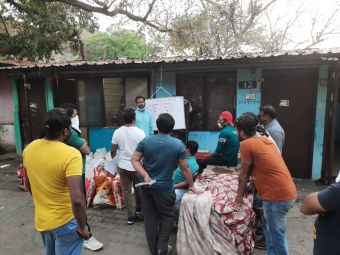
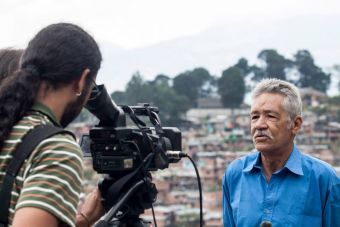
Medellin, Colombia
Alejandro Rodriguez is an MC and music producer and part of Old Guns, a hip hop collective from Comuna 13 in Medellin, Colombia.
Comuna 13 is a disadvantaged neighbourhood suffering from high levels of poverty and violent gangs. During the lockdown many residents could not make a living as they work in the informal economy as street vendors, builders, collecting rubbish and recycling. Thus, lockdown left them struggling to access food and essentials.
Picture left: Ciudad Comuna interview, Copyright: Ciudad Comuna
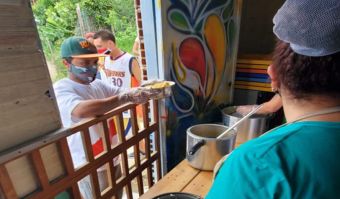
With the In Place of War grant, Old Guns decided to develop a community kitchen and allotment to address the issue of food insecurity in the area. They secured a building, partnered with a local community organisation, got permission from the gang leader who controls the area and enlisted an army of volunteers to work in the kitchen. During lockdown, the kitchen served 750 meals a week to vulnerable members of the community using produce from the community allotment.
Picture left: Kitchen serving meals during lockdown, Copyright: Alejandro Rodriguez
Caracas, Venezuela
Tiuna El Fuerte is an arts organisation located in El Valle, Caracas, Venezuela.
People living in tower blocks in the surrounding neighbourhood felt isolated and disconnected during lockdown, resulting in a decline in mental health.
Using the grant from In Place of War, Tiuna El Fuerte set up a mobile sound system and radio station, which travelled across the streets playing music and sharing messages over the sound system from loved ones across the community, helping people feel less isolated. They estimated that they reached over 20,000 people in two weeks.
Picture right: Tiuna El Fuerte’s Radio Verdura in the streets of Caracas, May 2020. Copyright: Tiuna El Fuerte
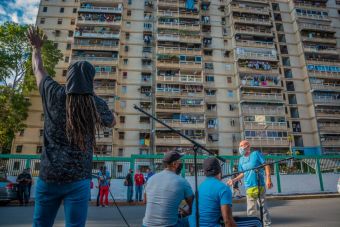
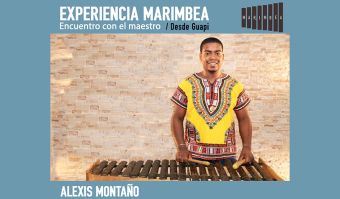
Cali, Colombia.
Marimbea is a cultural organisation based on the Pacific coast that works to promote Afro-Colombian culture through tours, performances and workshops. Due to the pandemic and lockdown, the community were unable to work and lacked access to basics. Using a grant of $1,000, Marimbea organised a series of online events, performances and workshops, paying the artists to participate and charging audiences to engage with the content. The events generated $2,000 in revenue and led to the development of a new digital content platform offering cultural experiences online.
Picture left: Promotion material for online workshop, Copyright: Marimbea
Reflections: What to learn for the idea of a Renaissance
These case studies provide interesting insights into the civic role of arts organisations in mobilising to address critical needs of local communities during the pandemic. This is hinged on a number of features. These organisations are committed to a place; often taking place in public spaces such as playgrounds, community centres, parks and schools, it is part of and shapes the local landscape. It is rooted in and part of their communities and thus artistic practice is designed by and for those communities. Given this, the art responds to the needs and aspirations of this community, and nurtures and celebrates the talent within the community.
Civic participation and artistic practice can not be divorced
This is a people-centric and local approach using artistic practice to facilitate human development, promoting positive values and social interaction and building communities. Given this, civic participation and artistic practice cannot be divorced: they are enmeshed and develop a symbiotic relationship. Art is a tool to engage communities which through participation leads to new artistic work and a more inclusive and diverse creative ecosystem designed to develop the community.
Indeed, one of the commonalities between these responses to the lockdown was that the organisations improved their standing within their local communities. Their work during the pandemic has elevated their status and visibility within the community and beyond. The creation of Trackside’s bakery and Marimbea’s digital cultural experiences are representative cases of this.
Picture right: Theatre performance about disability in Northern Uganda, Copyright: Mono Grande
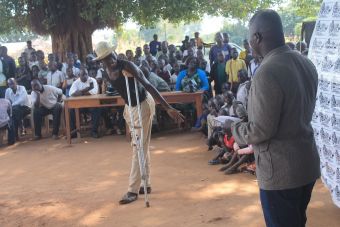
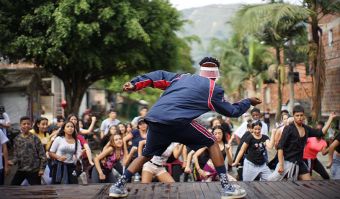
Radically nurturing artistic talents—and their aspirational community
We believe that, as in the case of our change-maker network, identifying and nurturing existing talent and projects in communities is key in developing genuine arts projects that respond and evolve to meet the needs and aspirations of the local community. Thus, rather than prescribing themes and agendas, offering support for the evolution of organic arts based community is of paramount importance.
Picture left: Dance class in Medellin Credit_Mono Grande, Copyright: Mono grande
Be innovative about funding social innovation
Similarly, developing more inclusive and open funding streams to enable grassroots, informal organisations to access funds to create civic arts projects is also key. We adopted a participatory grant-making model that allowed art organisations to develop responses that were tailored to their experiences and knowledge of their communities. They were not constrained by our preconceptions of what was the most critical need and this is clearly reflected in the range of responses the organisations developed. Small grants were distributed to informal groups and collectives as well as local NGOs which we were able to award without the need for clumsy and prohibitive due diligence processes, whilst crucially complying with charity commission regulations. Thus, in sum, the pandemic has illuminated the primordial role that local grassroots arts organisations can play in addressing critical issues facing communities, especially in times of crisis. They can be responsive and resourceful, generating immediate and real impact with little funding. This therefore invites us to rethink how we understand community arts projects beyond short-term interventions that respond to fleeting policy agendas and political strategies.
How can the cultural and creative sector foment grassroots, locally-led civic arts that showcase and celebrate talent in towns and cities in Europe both during and beyond the pandemic? How can we create inclusive and accessible funding processes so that such informal groups can develop and sustain their practice whilst generating long-term positive outcomes?
The creation of diverse networks and long-term relationship-building connecting commercial partners, governments, formal cultural institutions and grassroots collectives is key to fostering long-term arts-based social transformation in our communities—a transformation the green and digital transformations cannot do without—like, for example, the New European Bauhaus, the latest initiative of EU President von der Leyen highlights. Learning from the Global South how to empower arts-based social transformation in communities might strengthen a Next Renaissance in Europe while preventing one of its major risks: Of being a Revolution for the Privileged.
Links
Creativity Conquers COVID- A short documentary about the how IPOW’s change maker network responded to the COVID lockdown
Ruth Daniel
Ruth is a multi-award winning CEO, activist and change-maker. Inspired by the transformative use of hip-hop in the drug cartels of Medellin, Colombia, when a young MC said: ‘If it wasn’t for hip-hop, I would be dead. Hip-hop gave me another option and I’m truly thankful for that.’ Ruth believes art has a capacity to make change in the toughest of contex From guitarist at the age of 8 to record label owner, band manager, fundraiser, international cultural activist, entrepreneur, educator, influential speaker (TEDx) to prestigious award winner within a national arena (Social Enterprise of the Year & Manchester Woman of Culture to name a couple), Ruth’s passion to empower people to build their own positive futures through creative entrepreneur programmes, the development of cultural spaces and artistic collaboration shows no boundaries in terms of fields of work.
Picture © Katie Dervin
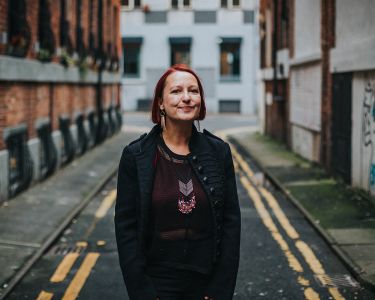
Teresa Ó Brádaigh Bean
Teresa Ó Brádaigh Bean is head of research and learning at In Place of War, a global charity that works to support grassroots arts based social change processes in sites of conflict. Her research interest and practice has focused on hip hop as a social movement, grassroots arts education, creative entrepreneurship in sites of conflict and community arts based peacebuilding. She has undertaken a number of research project exploring arts based social change processes mostly recently as a researcher on the the Art of Peace led by Prof. Oliver Richmond at the University of Manchester. She has played a key role in developing In Place of War’s education programmes. As a qualified teacher, she wrote CASE (Creative and Social Entrepreneur Programme). CASE was one of the five shortlisted finalists for the inaugural UNESCO-Bangladesh Bangabandhu Sheikh Mujibur Rahman Creative Economy Prize in 2021. It was awarded the Outstanding Contribution to Widening Participation at the University of Manchester’s Making aDifference Awards in 2017. The programme has been delivered in 14 countries including Bosnia, Uganda, Colombia, South Africa and the MENA. Teresa is an Honorary Research Fellow at the University of Manchester and a member of the Global Coalition on Youth, Peace and Security (GCYPS) a UN Inter-Agency Network.
Picture © Alexander Butcher
